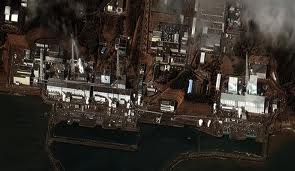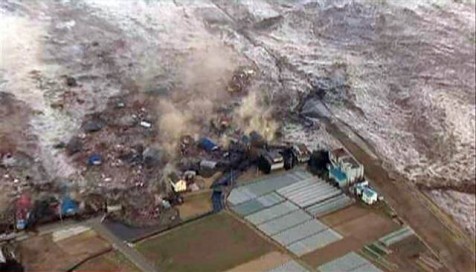
They’re called the Fukushima Fifty. This is a relatively small group of lower to mid-level managers, technicians, firemen, and electrical workers who are struggling to stop a nuclear disaster at the earthquake and tsunami-damaged Fukushima Dai-Ichi power plant. The Fukushima Fifty were left holding the bag for the political and economic elites who made the decision in the first place to use nuclear power to generate electricity.
However, the designation “Fukushima Fifty” is actually something of a misnomer. In reality there are about 200 men divided into four shifts of 50 who are actually engaged in the round-the-clock struggle to restore human control over four of the six damaged nuclear reactors as well as to re-establish safe storage for a vast quantity of spent reactor cores that are stored at the power plant.
Reliable information is sketchy. But already some of the original Fukushima Fifty, maybe five, have died. Another dozen or so have sustained injuries and have been replaced. Those still desperately trying to fix the Dai-Ichi nuclear power plant realize, however, that they are merely dead men walking due to the enormous quantities of radiation that their bodies are receiving. But in their quiet Japanese stoicism, the Fukushima Fifty carry on. Their duty is clear. Spare their nation and the rest of the world from the worst of the possible consequences of our collective human misjudgement, or die trying.
The self-sacrificing courage of the Fukushima Fifty is worthy of praise. These are brave men. They are heroes. Yet, the ability of some humans to muster great courage in the face of terrible danger is not the issue.
What lead us to believe in the first place: “We can control the Sun’s power of nuclear reaction. We can become rich from the energy that comes by splitting the building blocks of the universe! Indeed, aren’t we Homo sapiens, wise men? If we can think it, we can most certainly do it!” The real issue of our time is our human pride. Far too many of us think we can take to ourselves the prerogatives of God without reaping the awful, horrendous consequences that come from such arrogance.
Still, for some time now people in a variety of nations have argued against the wisdom of employing nuclear energy to fuel our economic growth and comfortable lifestyles. But these voices of caution have been largely ignored and a massive new construction program for greatly enlarging nuclear power generation is being planned in many nations.
Yet for the Land of the Rising Sun in particular, their embrace of nuclear energy to generate massive quantities of electricity was always a bargain with the Devil. They should have known better. After all, they had first experienced the pointy edge of the Sun’s nuclear power at Hiroshima and Nagasaki during the Second World War. And haven’t the Japanese always known that their homeland composed of islands on the Pacific Rim is a veritable supermarket of natural disasters?
Nevertheless, the Japanese like the Americans, Canadians, Brits, Russians, French, Germans, Indians, Chinese, Iranians, and all the rest have thought they could safely control this power of the Sun.
Humanity has long been disposed to thinking that we can be our own gods and decide for ourselves what is good or evil rather than accept divine revelation as our guide to morality as well as to economics.
“And the LORD God planted a garden eastward in Eden; and there He put the man whom He had formed. And out of the ground the LORD God caused to grow every tree that is pleasant to the sight and good for food. The tree of life also was in the middle of the garden, and the tree of the knowledge of good and evil…. And the LORD God took the man and put him into the garden of Eden to dress it and keep it [guard it, i.e. protect it from despoliation or contamination so that it would continue to be life-supporting]. And the Lord God commanded the man, saying, “You may freely eat of every tree in the garden. But you shall not eat of the tree of the knowledge of good and evil, for in the day that you eat of it in dying you shall surely die” (Genesis 2:7-9, 15-17).
From the time of our earliest ancestors we have resisted the instructions given to us by the Creator God of the Universe. The land surrounding the Chernobyl nuclear power plant probably cannot be safely inhabited for 10,000 years after the nuclear meltdown of 1986. While the human death count from the Chernobyl nuclear disaster varies widely according to different analyses (4,000 to 200,000 cancer deaths), the question remains how can the use of nuclear power be reconciled with the divine command to “dress and keep ” our life-sustaining earthly garden of Eden?
And what will be the toll in Japan? How much of Japan will become uninhabitable due to the contamination of nuclear radiation? How many people will die of cancers? The price for presumptuously taking to ourselves the prerogatives of God will be increasingly costly not only in Japan, but throughout the world.



